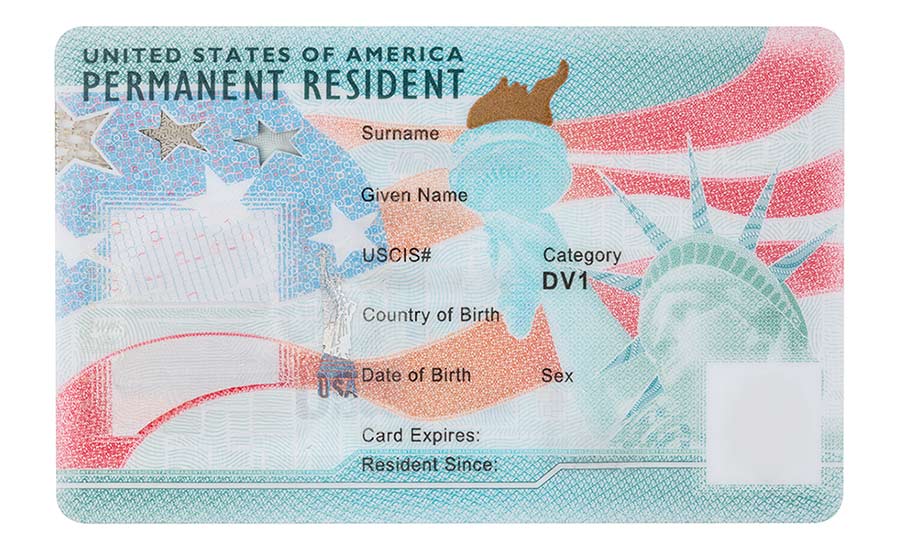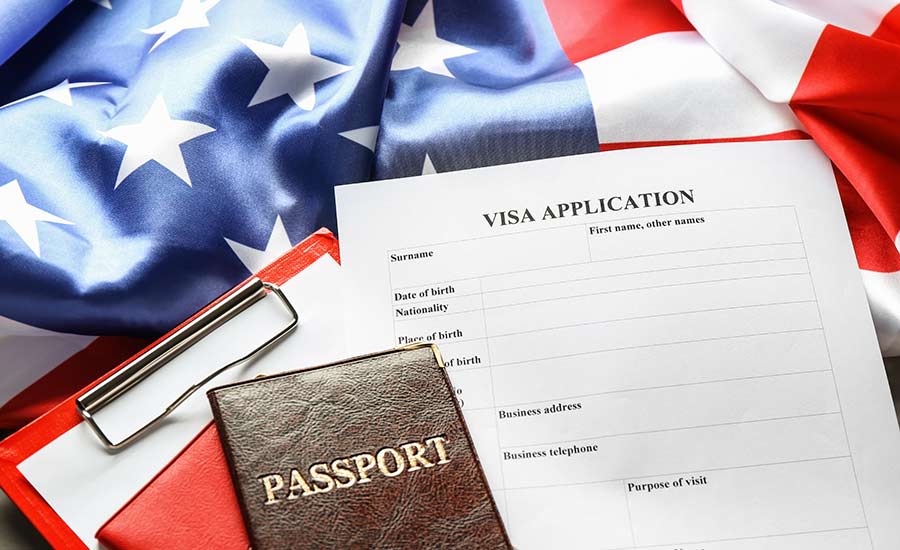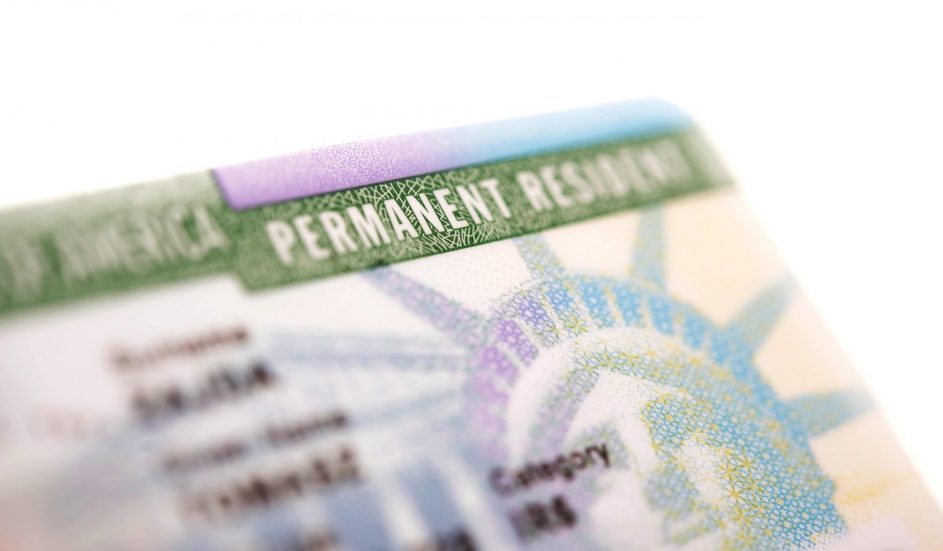

What is the difference between a Green Card and a visa, and which of the two is right for your situation?
You may be asking yourself these questions if you’re considering a job in the United States, studying at a U.S. university, or joining a partner.
We’ll cover the fundamentals of a Green Card vs. a visa, including their purpose, duration, and eligibility, so that you can decide which option is best for you.
What Is A Green Card?
A Green Card, also known as Form I-551, is an identification document given by the U.S. government to non-U.S. citizens who are authorized to reside and work in the U.S. on a permanent basis.
There are different types of Green Cards, such as:
- Family-based: For family members — spouses, children, and other relatives — of U.S. citizens or lawful permanent residents.
- Employment-based: For professionals and skilled individuals who have job offers from U.S. companies or are self-petitioning in some categories.
- Humanitarian: For refugees and asylum seekers, victims of human trafficking or crime, and other humanitarian initiatives.
- Green Card lottery winners: For people chosen in the Diversity Visa Lottery program, which encourages immigration from underrepresented countries.
Read more about what a Green Card is as well as its benefits.

What Is A Visa?
A visa is a document or stamp that allows a foreign individual to enter, stay, or travel within the U.S. for a specific purpose and duration.
A visa is typically issued by the Department of State and placed in your passport.
Visas can be grouped into two main categories: immigrant and nonimmigrant visas.
Immigrant visas are issued to individuals who want to move and live permanently in the U.S. and who are sponsored by a family member, an employer, or in another category.
For example, you can apply for:
- An IR-1 visa after marrying a U.S. citizen or a Green Card holder to immigrate to the U.S. and live with your partner
- An EB-1 visa if you have extraordinary abilities in your field and want to immigrate to the U.S. to continue your work
- An EB-3 visa if you are a skilled worker or laborer sponsored by a U.S. employer to work and live permanently in the U.S.
Nonimmigrant visas are temporary and are issued to individuals who plan to stay in the U.S. for a specific purpose and limited period. They can be used for tourism, study, work, or medical treatment.
For example, you can apply for:
- A B-2 visa to enjoy a vacation in New York City or visit Disney World in Florida
- A B-1 visa to attend a business conference in San Francisco
- A F-1 visa to enroll in a 4-year undergraduate program at a U.S. university
- A J-1 visa to participate in a 12-month cultural exchange program
- A H-2A visa to work as a seasonal worker helping to harvest crops during the summer

Green Card vs. Visa: Key Differences
Both Green Cards and visas are key documents used by non-U.S. citizens. However, they differ in several important ways.
Purpose
A Green Card grants permanent residency in the U.S., allowing you to live and work anywhere in the country indefinitely.
An immigrant visa facilitates long-term relocation to the United States. It is often the first step in getting a Green Card.
A nonimmigrant visa is meant for a short-term need or activity, after which the visa holder is expected to leave the U.S.
Duration
A Green Card gives you a lawful permanent resident status, which is indefinite unless revoked due to legal issues or abandonment of U.S. residence.
The physical document is typically valid for 10 years, after which it needs to be renewed.
If you have a conditional Green Card received through marriage or employment, it is valid for only 2 years and requires additional steps to remove conditions. Read more about the process in our article covering how to remove conditions from your Green Card.
With an immigrant visa, you can enter the U.S. and receive a Green Card, which allows you to stay indefinitely and eventually apply for U.S. citizenship.
The duration of an immigrant visa depends on its type. For example, the EB-1 is typically valid for 10 years.
If you have a nonimmigrant visa, you must leave the U.S. when your authorized stay ends. For example, an F-1 student visa is valid for the duration of your studies.
After your visa expires, you can remain in the country if you:
- Apply for an extension
- Change your status
- Transition to an immigrant visa
Eligibility
To be eligible for a Green Card, you must:
- Have a family relationship with a U.S citizen or a lawful permanent resident
- Be sponsored by a U.S. employer
- Have refugee or asylum status
- Participate in special programs like the Diversity Visa Lottery
To be eligible for an immigrant visa, you must:
- Be a relative of a U.S. citizen or lawful permanent resident who petitions for you
- Be sponsored by a U.S. employer for an employment-based immigrant visa
- Have extraordinary ability or qualifications
- Make an investment in a targeted area in a U.S. business
To be eligible for a nonimmigrant visa, you must:
- Intend to visit the U.S. temporarily for tourism, business, medical treatments, or education
- Receive a job offer from a U.S. employer for a temporary job
- Be a foreign exchange participant in a cultural exchange program
- Be an artist, performer, or athlete traveling to the U.S. for a specific project
Path To Citizenship
A Green Card is a direct pathway to U.S. citizenship through naturalization. To become a U.S citizen, you must:
- Hold a Green Card for 5 years (or 3 years if married to a U.S. citizen)
- Prove you have good moral character
- Meet residency requirements
- Pass a citizenship test
An immigrant visa allows you to travel to the U.S. and apply for a permanent residency status (Green Card).
A nonimmigrant visa does not directly lead to citizenship.
However, in some situations, you may have the right to change your immigrant status — for example if you are in the U.S. on a H-1B visa and marry a U.S. citizen (check out our article about H-1B to Green Card). Once you get a Green Card, you can pursue citizenship if you meet the requirements.
Need Help With Your Green Card Or Visa? Schedule A Consultation
Whether you need assistance with your Green Card application or want to apply for a visa, Spar & Bernstein can help you in the process.
To help with a Green Card, our team of immigration attorneys will:
- Help you determine your eligibility
- Prepare and file required immigration forms, including Form I-485, Form I-130, Form I-140, Form I-864, Form I-765, Form I-131, and Form I-824
- Assist with special cases, such as asylum, refugee status, or the Diversity Visa Lottery
- Help you prepare for interviews
- Represent you before government agencies and act on your behalf
If you need legal support with immigrant visas, we will:
- Guide you through family-sponsored and employment-based visas
- Assist with filling out and submitting your application or petition with all supporting documents
- Provide advice on transitioning from immigrant visas to Green Cards
If you need advice about nonimmigrant visas, our lawyers will:
- Help you determine which, and apply, for the visa type you need
- Offer support for renewing or extending your nonimmigrant visa
- Explain your options of transitioning to a different status, if you decide to stay in the U.S.
Green Card vs. Visa: FAQs
If you want to know more about a Green Card vs. a visa, check out the answers to some common questions.
Do all visas lead to a Green Card?
No, not all visas lead to a Green Card. Nonimmigrant visas are for temporary stays and don’t lead to permanent residency.
Do I need a visa to enter the U.S. if I have a Green Card?
No, if you have a Green Card, you don’t need a visa. Your Green Card gives you the right to travel abroad and return to the U.S. without the need for a visa.
Which is longer: a Green Card or a visa application process?
The Green Card process is longer since you need sponsorship from a family member, an employer, or meeting other eligibility requirements.
Do I need a lawyer to apply for a Green Card or visa?
You don’t need a lawyer to apply for a Green Card or visa. However, a trusted law firm like Spar & Bernstein can help you with the processes and increase your chances of approval.





